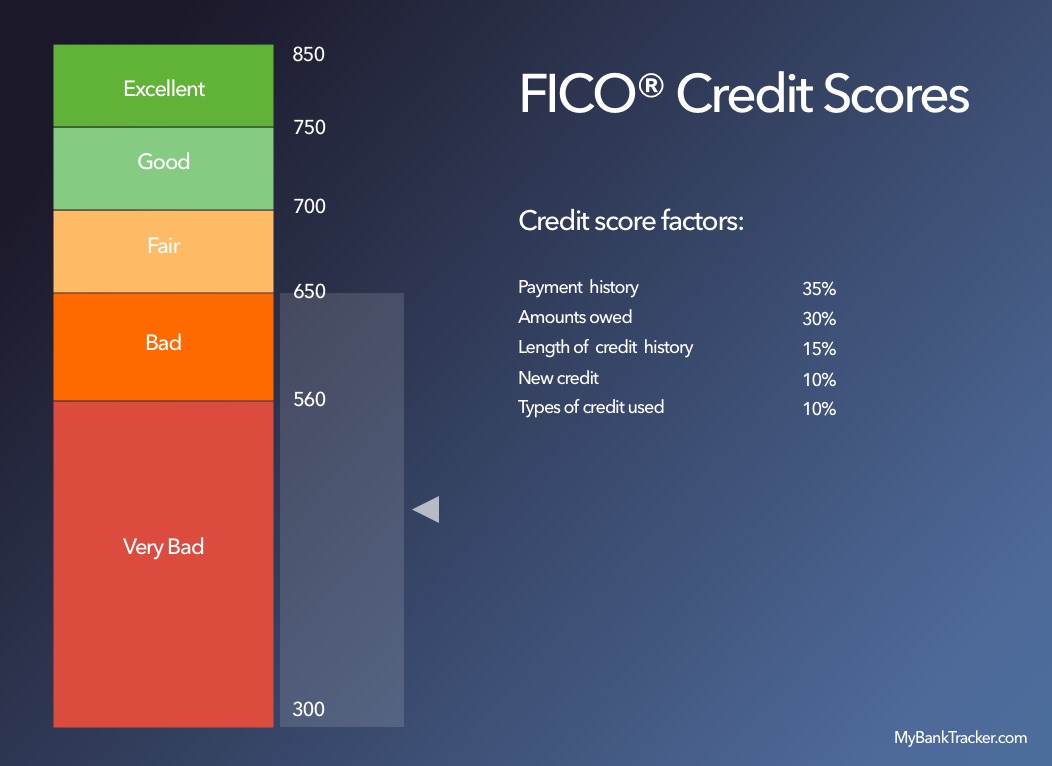What’s a Good Credit Score For a College Student?
College is a great time to make memories, get a once-in-a-lifetime education, and ignore all of your financial responsibilities.
Odds are while you’re in college, you’re not really paying much attention to your credit score.
Even though you’re not paying attention to your credit score, it certainly is paying attention to you.
So, what exactly is a good credit score for a college student to have?
How Are Credit Scores Calculated?
Your credit score is based on five main factors.
Although these factors are calculated by a secret algorithm that makes up your score, the components of your score and their weight are clearly laid out.
(We’re focusing on FICO credit scores because more than 90% of U.S. lenders rely on them.)

- Payment history. Your payment history shows lenders how you have handled payments in the past and makes up the biggest “chunk” of your credit score. Any late payment will show an increased risk to lenders and have a significant impact on your score.
- Amounts owed. Your credit utilization ratio on your credit cards is the second most significant criteria for your credit score. How much you owe vs how much credit limit you have is a balance. Strive to use only 30% of your available credit for the best utilization score.
- Length of credit history. There is a common saying in the credit industry: “The best credit is old credit.” Credit bureaus look at how long accounts have been open, how long specific account types have been open, and how long since accounts were used.
- New credit. New credit inquiries occur when you’re applying for new credit. Make too many inquiries and it may appear that you’re desperate to borrow. According to Rod Griffin, director of public education at Experian, “In general, it’s best to be conservative when applying for new credit. However, this doesn’t mean you should be afraid to open a new account.”
- Credit mix. Lenders prefer to lend to consumers that have a variety of credit types, including installment credit, auto loans, revolving credit cards, and mortgage loans.
Important tip: Financial experts generally advise against applying for too many loans or various credit cards in order to build up their FICO score.
Your credit score is linked to your social security number and contains only credit-related information.
The Equal Credit Opportunity Act (ECOA) prohibits lenders from considering factors like nationality, gender, race or marital status in making a credit decision.
Importance of a Credit in School
A good credit score is important. While you’re in school, you may not need to apply for mortgage loans or car loans, but it is likely at some point in the future that you may need loans.
If you will be moving after college, you may have a credit score check for rental housing.
You may also want to go to graduate school, such as medical school, law school or business school and need to apply for student loans to finance your education.
It’s a worthy goal to come out of college with as high of a credit score as possible.
Defining a “Good” Credit Score
Credit reports are not started at a certain age, and many college students, especially those who are supported by their parents, may not have a credit history.
You could be in your mid-20s and still not have an established credit history.
In theory, it is possible to go a lifetime and not have a credit history. However, avoiding a credit history is not a realistic or beneficial goal.
A positive credit history and good credit score will give you purchasing power for things you want to do after college.
Generally, a credit score of 700 or above is generally considered “good” — you’ll be able to qualify for most loans (as long as you also have sufficient income).
There are various ways that you can check your credit score for free. Many credit card companies, including Capital One, Chase, and Discover, will provide free credit scores for anyone.
From there you can see what you need to do to improve your credit.
It is possible that there are inaccuracies or errors on your credit report. If your credit report contains inaccurate information, you can dispute it.
How to Improve Your Credit at an Early Age
It’s always a good time to work on your financial future.
Even if you are busy with getting an education, and have limited income, you can make smart spending decisions and not put yourself in a situation where your credit score may decline.
The following are tips for improving your credit while you’re in school:
- Start paying down your student loan. You’re not alone if you will be leaving school with student loan debt. The three major credit bureaus treat student loans as installment plans. Monthly payments may not be reported to credit bureaus while you’re in school, but the amount you owe will go down, resulting in a lower balance.
- Pay down your credit card debt. If you have credit card debt, make strategies to pay it off. Consider paying off the most expensive, highest interest debt first. If you get paid weekly, try to make weekly payments. Paying the minimum amount on your monthly payment only prolongs your debt payoff. Try to double your minimum payment if you can. Use a debit card for everyday purchases to keep your balance from growing.
- Get a secured credit card. A secured credit card is a way for you to get a credit card if you have a low credit score, items such as delinquencies or bankruptcies on your credit, or no credit history. You make a deposit, such as $500, which is used as “collateral” should you default. You will then have a credit card with a limit of the amount you have deposited.
- Pay all your monthly payments on time. Defaulting on a student loan or credit card payment can have serious consequences to your credit, and your future. This could mean you may not be able to buy a car, a house, or even get a job. Plan your monthly spending accordingly so that at the bare minimum, you can afford to make your minimum payments.
- Don’t apply for too many credit cards. You may have heard that having too many or too few credit cards can hurt your score. Far more important than the number of credit cards in your wallet, is staying in good control of your credit card usage, diligently making your payments, and keeping a low credit utilization.
- Put money away. Having a savings account can be an insurance against a defaulted payment or help in a financial emergency. Consider setting up a high-yield internet savings account and contributing to it monthly. Many banks offer easy online deposits and transfers, no fees, and no minimum account openings.
Conclusion
Remember that your credit score is simply a snapshot of your current assessed risk.
Think about your current bank account balance now, and what you’d ideally like it to look like in five years. You have the opportunity to save more and make that balance much higher than it is now.
Your mindset about your credit score should be the same way. You have the opportunity to change what it will look like.
Make smart financial decisions, pay off debts, and improve your future credit opportunities.

